An enigmatic story that unfolds itself through metaphors and images, talking of dreams and desires, of love and lust and the quintessence of womanhood. This story is a part of the collection of stories, titled Shivelight and other Tales, – a work in progress, by Jayita. It’s a part of the Special Feature, exclusively for Different Truths.
LAVANYAAAAA…
The hills coming to life in a wispy shivelight streaming through the misty dawn rang out in a silent scream!
A grisly haired fat, tallish man in crushed clothes, crushed heart, and crushed youth peered into the streaming gold spreading over the waking mountains. He had come to Dumpa monastery on the mountaintop through ruined roads and landslides in search of his lost love, – Mandarava. The mountain God yawned at the man’s lost youth and corrupted glory, bemused at how Mara has trapped him to perfection. The man’s sunken lightless eyes in folds of his facial flesh, which reeked of wasted nights and
liquor bored the God. The Mountain God was used to such sights of human vanity. He shifted his gaze to the young lad playing a hilly tune on his bamboo flute to the beats of a madalay geet in the flanks of the rolling green, bathed in divine light.
A Kingdom cradled in blue and white mountains, was guarded by the gold, red and green dragons, as you drove in. The young environmental scientist from Texas, who picked up Nepali faster than the madheisas below actually hammered a rock open to find fossilised remains of a flying dinosaur tooth just as he had picked a handful of red garnets from the waterbed of slithering poisonous snakes in one of the jhoras on your way to Rabong. If the country pinned you down with a label and the privileges that went with it, did it really matter, what these ignoramuses thought about you? Yes, it did, it did indeed! You were a king here. How dare they mix your identity with the identity of those there in the mainland? Yet, they did. The policy makers. They re-named you as “Adivasi”. What a laugh! A migrant race of mountain people had no “adi” (beginning) or “anta” (end) about their origins. They were always on the move. If your father hailed
from Nepal, your mother could be Bhutanese, or Sikkimese or from Darj. A DNA detection would possibly trace your ancestry somewhere in Mongolia or Tibet, or to Lao Tze even, or the lineages of Padmasambhavas … only a Buddha knows what? A Buddha with an anthropological hindsight of course!
To an outsider, all were the same. The Bhotes and them and the Lepchas. Especially the Bong tourists, with their Babu airs and disgusting social habits! Listening to them address you would create a riot of red rashes of anger and irritation under your skin! They called everybody a Lepcha. Idiots, all of them, without any sense of history! Yet, they came in floods in March, April, May, till the god Kanchendzonga turned sides in his sleep, which made the clouds groan and bring down the waters from the peaks in a torrential downpour. So, the monsoon was the lean season. Again, the autumnal serenade would draw tourists in such flocks that the Mall would ring out with vernaculars from mainland India. Disgusting though it was, for chocolate wrappers, roll wrappers, uncle chips packets were strewn everywhere, the tourist industry and wine industry boomed, momos were sold out by the afternoon and needed fresh orders. Money flowed in from homestays, hotels, souvenir shops and resorts owned by Marwaris who had forgotten that there existed a Rajasthan on India’s map. They continued to contest their status as original inhabitants in the Supreme Court impudently. Gorkhaland was a strange pickle! Hot and chilly like some local home remedy, its spicy perfume wafted over the mountains. It could not be always trusted when the disease was too deep for an easy cure.
Chanka Chemjong peered out of his Jeep to take a survey of the damage caused by the last night’s downpour. Roads were forever under repair in Jorthang. He took a quick sip from the bottle tucked in his waist-belt. The rum warmed the body and soul, it allowed your mind to run crisscross over the thought tracks as you drove through the bends and landslides. It has been a struggle to reach to the top. To hold the high chair from where you could condescend the plains below. Yet the chair could not reach out to Lavanya, even when she was his once, once so fully and yet elusive still. Chanka took a second sip
from his bottle, to wake up from sleep gathering around him. He peered through the fog and silhouetted conifers on the edge. Driving was his passion. He could have asked for Tshering, but he didn’t. Another two hours, and he would reach Dumpa.
It was a March morning. Spring was in the air in the lower altitudes but a wintry breeze through the pines here rustled the cones with a longing for the warmer season, tenderly caressing the white snowy downs in the mellow sun. The climb was a steep one. She was running through the smokescreen of mist and mellow sunlight. Her hair streaming in the sun and the dawn lovingly encircling a halo around her head. She was the rippling laughter of the waters of Teesta cascading through the dappled mountain clefts. He panted up the stony stairs heavily unable to catch up with her. She ran over the slopes like a mountain nymph, her feet hardly touching the ground. Sweat broke on his forehead even in that cold as he longed to catch the frill of her red skirt flowing like a purple dream.
Dream it was, a dream which was so real, that it chased away the reality of his daily life. It created a trellised archway in his thoughts, transforming his aging body to the spirit of the ten-year-old running through his pre-patterned pathways of life to catch his red dream.
Irfan! She and Irfan! Who was Irfan? A Bong yet so very Nepali because of Lavanya. He spoke his Bangla in a typically Darj Nepali accent now, with his sss and shhhs all blurred in szzzz, to a sneeze that remained of the dialect of his mother tongue! His features? No, they were not Bengali either! It is a proven genetic and anthropological fact that a husband and wife might begin looking alike if they were together for over twenty years or so. Genes have a strange way of transmuting themselves through entangled heart and
blood relationships that marriage was compounded of. So, Irfan who was Lavanya’s lover, transformed into a Nepali through a marriage of true minds not accepting impediments of caste and religion. Lavanya learnt to cook biriyani just in the manner she picked up the yoga of the namaz four times a day. She would rather go to the mosque, the only one near the Mall than visit the Dumpa monastery which spoke of her other life. Her past life was shoved away, shelved somewhere in some remotest corner of her memory, where Chanka figured like some shredded clouds stuck to the pine cones. Abandoned and cast away. Lavanya Tamang was reincarnated through the thickness of love thicker than blood into Lavanya Begum. When her family disowned her, and she lost all property and land which went to her brother’s share, she still managed to look like a queen in her nuptial glory. Chanka Chemjong, her playmate, her lover who could never speak of his love to her, faithfully guarded her, like a dragon with open fangs when
someone from her tribe made a dig at her.
A tree uprooted from loosened rocks blocked the road. There were two of the Black cats with some drivers hauling and heaving to shove it down the gorges on the left. The loosened earth continued to slide down with pebbles and mountain dust. Chanka got out of his jeep and watched the men working to clear the debris. There was actually so much debris that had accumulated in the form of anguish, pain, and longing which bypassed the fact of rejection. Well, not exactly that, for how was rejection possible when there was no proposal? Is it always important to speak one’s mind? Wasn’t there something called
intuition? Irfan was not even handsome. And he had weak vision. Yet one really marveled at his nimble steps on the mountain stairs. He was faster than any fully abled person. Chanka recalled how Irfan ran up the stairs from the basement meeting room of their office, when Kanchendzonga changed sides that monsoon afternoon. A tall bald old man, with blunted features, small eyes, his sensuous lips half open in fear and for short of breath, pounding his way up to the ground floor and the pavement. And then the
quiver split up mother Earth, and cracks snaked their way to the edges of the pavement. With a groan, a chunk fell apart and the iron railing had clanked to the ground in a scream! People were screaming in horror and Irfan’s voice mingled with them. Chanka had closely followed Irfan with his eyes. Lavanya’s husband cannot die. No, never. A pain suffocated him. Very difficult to explain the nature of this pain. A pain mingled with guilt, for he was reminded of his wife in Namchi Holy Cross School. Poor thing,
she slogged the whole day! A mother-in-law doubling over with age who could barely walk a step steadily, a grown-up daughter, in her twenties caught in the time lapse of tradition and hip-hop- rap-modernity. Falling in love, was never a crime, but when it came to the wedding bells, it had to be the Tomcat from one’s own clan. A mother’s anxious eyes watching her daughter bloom like those pink rhododendrons in springtime glory, made her forget a husband in the town, left to his own wits and fads. Life was decided when one was in mid-fifties. So how far can the goose go? And how did it matter when he finally came home to roost? Sonu was old before her time. A wrinkled sagging face, her thin body drooping with fatigue. A silent slogger, complaint-free, with a sense of duty and perfection is what described Sonu. In those nights of longing, in their heydays, she met him with submission, for yielding to husband’s desire was a wife’s duty. Chanka did not remember her expressing her own desire ever. She had always yielded willingly, but joylessly. At times, when he searched for his red dream in his drunken stupor plumbing her depths in deep frustration and longing, she had received him with clenching pain spreading over her face and her tightly closed eyes shedding tears of understanding. In those nights, when he courted Lavanya in Sonu’s body, he had called out Lavanya’s name several times over. When the dawn revealed the reality, and Sonu lay crumpled in one corner of the bed like a lost child, hugging herself for comfort, Chanka would want to kick himself with guilt and remorse. Ayesha, whom he secretly
called Tara, was the crop of such nights. She was truly Lavanya’s, though Sonu bore her. So, when Chanka tore away Tara from her mother’s breast, ruthlessly to save Lavanya’s honour, he surely committed no crime. Sonu had wept silent tears, and her protest was a silent one with no food days for a week, till her mother-in-law poured sense into her head to eat and survive, for the other girl-child was barely three then.
The road had cleared, and the cars had started moving. Slowly the day had cast long shadows over the hills, adding shades to the blue and green fauna and waters of the jhoras gurgled over the broken roadways heedless of the driver’s tension not to skid into the gorges. Last time when he had visited the monastery, on the top of the mountain peak, Lavanya had pleaded to come with him. One might embrace a religion for love’s embrace, but the seeds of a culture were sown the day the child was first initiated into
life with mother’s beliefs, customs, and codes. Lavanya that day was in her traditional attire. Her eyes were flushed and downcast. She was silent throughout the journey. Irfan was in the plains, to meet the politician for his promotion to a higher post in the Institute of the Social Sciences which they both served and where they had met, to fall in love and be partners for life. Irfan lusted after power, chair, and promotion. Something that bewildered Chanka at times. Wasn’t it enough to be happy with a lovely wife like Lavanya and have enough for the family? Chanka had glanced at Lavanya from time to time and tried whistling, “He is a jolly good fellow” or “Resham firiri” while driving. She had only looked away with disconcerted eyes. He was deeply troubled and could sense that the uncanny tension which spilled over the silent spaces between them, awaited eruption some time or the other.
Once they reached the monastery, he had left her at the prayer room, with Padmasambhava and his consort Mandarava in their divine sexual union and eternal bliss. Quite some time was spent enquiring after the master’s health and the children’s progress in the school attached to the monastery. When the day had stretched to dusk, and it was time to close the prayer room, he went to fetch her. It was impossible to go back the same night when one travelled such a distance and to that altitude. As Chanka’s
parents were a good friend of the master’s master and Lavanya’s and his family close enough to travel together, they had come here often during summers of years ago. Two rooms were arranged for them then at the master’s order. But this old man now, who was the master, had made a wild mistake. He had thought that they were man and wife! Chanka had tried once or twice to correct him, but then later decided against it, for some incipient reason. The false reality gave him a sense of secret pleasure and at the same time, its correction could raise eyebrows. So, it was better to accept the lie. When he peeped into the prayer room, he found Lavanya sitting still. He went inside and lightly touched her arm. She turned around startled. Chanka was beside himself in surprise to see her bloodshot eyes pouring pain and distress. Before he could gather himself Lavanya had steadied herself and walked out of the prayer room, with hurried steps.
Soberly and awkwardly they had shared meals together as the master prattled about the lack of funds, the status of Buddhist education and the modern times, about the kids and their truants, their family problems, adolescent pangs etc., etc. It was rather dark by the time they had parted for the night’s sleep. Pain, confusion, and turmoil wormed their way up from lower abdomen to Chanka’s brain.
It was time for him to be tense now. Would Lavanya react to this arrangement? But Lavanya had said nothing. She had just rolled herself into a blanket and turned her back to him and edged towards the wall. Chanka with his pounding heart and throbbing veins had calmed himself with some rum and tried to sleep. The lantern’s shades had licked up the walls with suggestiveness which Chanka was trying his best to cast away like the unwanted debris on the road after a landslide. Sleep like the soft fall of the snow from the skies had dropped gently on him. It was a long drive and the rum was doing its work.
He was almost asleep when something unbelievably soft like the petals of a rose touched him deliciously on his brows, lips, hands, chest, and was soon all over him like a wave of pleasure that he had never known before. Nectar which was pouring into his lips, throat and run riot in his veins, electrified his soul. He was in a khechari mudra, super-consciously one with his beloved. The red dream was holding him in a cradle of infinite ecstasy. He was intoxicated by the perfume of the Mandarava flower in full bloom, melting away into a transcendental bliss like the Padmasambhava in his sacred union with his consort. The chant “Om Mani Padma Hum” rose from his heart like a wave of music to drown him in an ocean of Blessedness!
Right at this moment, a discordant note struck to destroy the joyous harmony. It came with the soft petals shaking vigorously and producing a noise somewhere between groans and loud sobs. Chanka had opened his eyes in horror, to find her in the light and shade of shame, pain and broken delight. What had he done? Chanka had covered his face in shock and disbelief. Yet she had made no attempt that night to cover herself with modesty and this time reached for him in his full consciousness. Mandarava. Lavanya
was Mandarava. She had wept almost praying to him for an illegitimate gift which only love can give.
Irfan had failed her there.
So much water had flowed since then … Teesta had absorbed the song of anticipation and expectation of the lives that sent their vibrations to her flow.
Lavanya/ Nishaat Kazi was in labour pain. The father, Irfan Kazi was bursting with tension and anticipation. Yet the struggle continued so long that the doctors had no choice. When the night had paled into a weak dawn, Lavanya gave birth to a love’s corpse. Waves of drowsiness and exhaustion had carried her away like floating clouds over the bluish mountains to the divine flanks of the mountain where Tara Mata resided to offer her balm and blessings on her new motherhood. Irfan had fallen asleep exhausted with waiting. The doctor had none to disclose the tragedy except Chanka, who by this time knew what he had feared to be true. Back at home, Sonu had given birth to a baby girl, a day before. There was only one choice and one solution to the problem. So, Tara was reborn as Ayesha in Nishaat Kazi’s lap the next morning. While a mother rejoiced gaining a child, not hers, another fasted and wasted away in silent grief. The secret was trusted with Padmasambhava.
Teesta poured waters of unceasing love despite dams were built, and projects sanctioned to gag her and rape her to a slimy-green- still waterbody. Daughters grew up, mothers tended to their children and fathers occupied important positions in their places of work. Irfan had managed to bribe the politicians to get a professor’s post in the Institute. Chanka managed to catch the eye of the people who matter in State politics to be the nominated by the government as the Director of the Institute. Friends through a
common woman’s love were lovers too. Just as Rana had to court Krishna to win Mira’s love, Chanka had courted Irfan for Lavanya’s love and trust. There could be no impediments to the marriage of true minds, didn’t the bard say? So, when the impediment came in the form of a scholarship and womanly grace from the mainland to question Irfan’s academic credibility and ethicality, Chanka turned into a dragon of yore
with malicious fangs ready to kill. But that’s another story.
***
Chanka had reached the monastery. It was too late in the night to knock anywhere. He didn’t even know who succeeded the last master. As he stood staring at the monastery half covered in fog and mist, he wanted to cry as Lavanya had had that night, so many years back in time. He wanted to confess his sins of flesh committed daily, laced with alchohol to drown the acts of power. Flowers, of seasonal variety, yielded easily, for privileges he offered them in their career. Young ones, fresh and shared, by husband and the employer, middle groups, slightly aging ones and yet ripe still … his glasses were always full. They all tasted the same, headier if the flowers bloomed elsewhere in faraway plains seeking hearth and job in the hills. But there was more reason to explain his need for the confessional Buddha to be addressed for such acts of lust and revenge. Lavanya had been detected with cancer. She coughed up blood. It was as if his sins had worked their karma into her lungs.
As the blanket of the night swept over, howls of wild dogs split the harmonious sounds of the flowing streams and waterfalls and the night breeze with an uncanny warning. Chanka knew he needed to take shelter. He got back to his jeep and started driving down to the market below to the Dumpa resort. Glasses filled to the brim, glasses clanking against each other, glasses through which the flowers propped their stained petals were making him dizzy. That fat girl from the suburban Ganges town, with spilling health and her pitiful eyes in fearful submission, for being his afternoon passion-flower was secure in her job. She was always handy when the need arose. ‘His faithfully’ in letters and service always. But the lady with her academic elegance could not be undraped of her ladylike mannerism or forgiven. The one studying Buddhism. The one who dared to expose Irfan’s academic non-viability. She just left and did not
mince her words before she did. Veins of stress, deep anger and despondency stood out on his forehead. He could have killed her. Smashed her under his weight of flesh and hill-strong muscles and bones and torn her up like a dragon and churned her with his fuming hatred. But she was unbeatable, unputdownable, untouchable! Nausea seized Chanka, thinking of her. She had called him a pig! A pig?
And yet, yet when that nymph not so much over twenty-six or so, yielded as a mature woman, he knew that the pig too had its worth! But Tara had smashed that special feeling with a blow when he went to meet Lavanya and Irfan last Sunday evening. Ayesha as he called her openly and Tara secretly to himself, wanted to introduce her special friend to her uncle. Her friend was not only a topper in a Delhi University but a dancer too. They were batchmates and hostel mates in Delhi. Ayesha Kazi did not know that her special friend was an applicant in his uncle’s Institute. She did not know that the university topper besides beauty and brains had the common sense too, to go by the ways of the world. She did not know her friend that well as her uncle did, inside out, just as a bee knows the art of the honeysuckle. She looked different here with Ayesha. Innocent like a white Tara, beside his own green Tara or Ayesha, in her youthful grace. But looking at her, he had felt the sharp jabs of desire to suckle the flower again till she
dripped of sweetness, sweeter than the flower-wine in Dorjee’s wine shop in the Mall. As the dizziness gripped him, he had hastily left the Kazis to make way to his home-bar and lace himself with a strong drink from the cocktail he had then made for himself.
Chanka stood before the mirror in the washroom in the Dumpa resort. His head reeled with the strain of thought trellises crisscrossing over stories of love, passion and neurotic rage of the history of mainland’s repression. He sought hopelessly in the cringes of his loosened flesh the beauty that had embraced Mandarava. The flower had turned cancerous at his sinful touch! The bowl of transcendental bliss reeked of alcohol.
His eyes had lost vision like Irfan’s. They were brothers in crime seeking and staining Mandarava with their lust.
The mobile was ringing a long time. Chanka reached for his phone with shaky fingers. A tearful green Tara sobbed out the news! Irfan was shattered.
He was weary. So weary that to walk a step further, needed immense effort. Chanka stretched over in the white stainless bed in exhaustion and meaninglessness. The mobile was ringing again. He put the mobile to his left ear. Sonu’s voice seemed to float from faraway. She was saying something which he could hardly understand. It had something to do with Sonu’s daughter. It was past midnight, but the girl’s office-work had detained her for some reason. Sonu was inconsolable in her grief and tension. Wasn’t the girl’s father the Director of the well-known Institute? How could the employer dare do this to his daughter? Wasn’t Sonu his wife and the girl’s mother? Where was he, the father? Where was he ever in their life’s journey? The non-complaining, docile, yielding, submissive Sonu had suddenly turned into a ranting piece of horror! Chanka crashed the mobile on the floor in utter disgust.
Disgust had become the stuff of his life these days! Even when the curtain of stars cast a mystic veil over the mountains, Chanka felt nothing. The gold which spread with the Midas touch of a glorious Dawn over the snowy peaks left him dead. His Mandarava was dead. She was another corpse that he mated every day to sustain his piggish craving for youthful feminine flesh. His search for Mandarava was a compulsive desire to hold on to a demented blood-speckled dream.
Notes
Mara- The demon who attempted to distract Buddha with his three beautiful daughters
Mandarava- A consort to the 8th Century Padmasambhava, who is said to be the founder of Vajrayana Buddhism.
Khechari mudra- A mudra where the tongue rolls up to touch the throat in deep meditation and nectar is produced in the throat of the devotee, as a sign of his divine union with the Supreme.

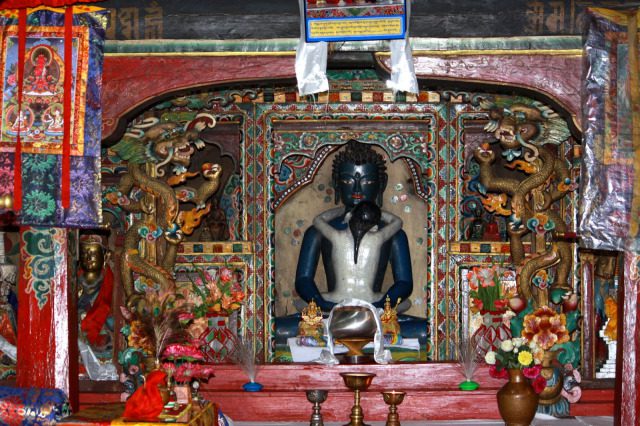
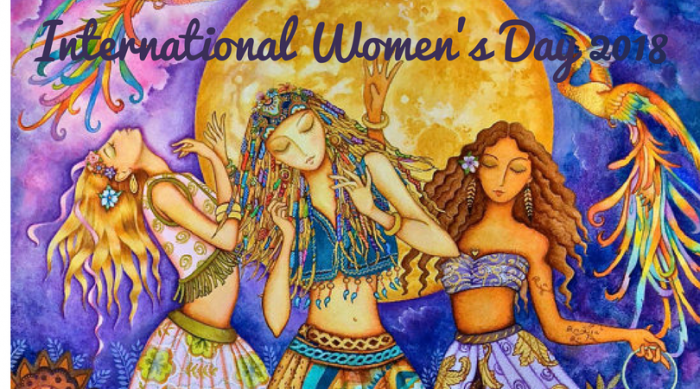


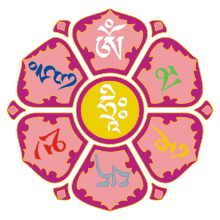


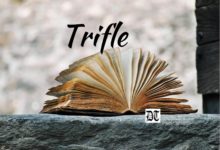
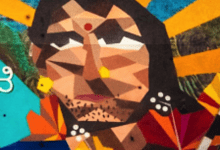

 By
By

 By
By
 By
By
Just loved reading this story, so richly textured with the Buddhist myth using it so ironically to expose the evils under the cover of society. The vivid mountaneous topography comes out beautifully through the narrative. Also the rift between the mountain people and the plains. Found this to be a rich narrative addressing many socio-political issues as a lived experience. Fresh writing! For those who live in a world not familiar with this, the story might be unnerving.
The richly layered subtexts makes for a powerful narrative!